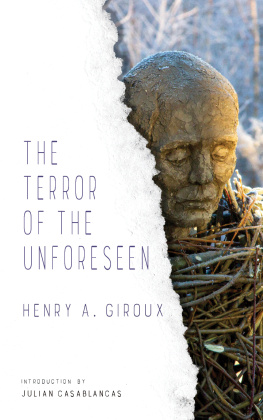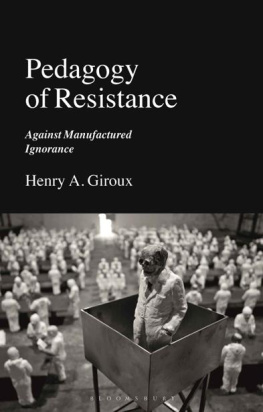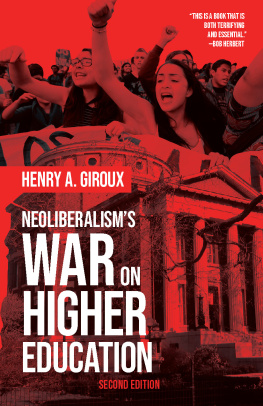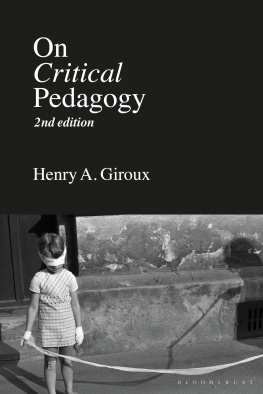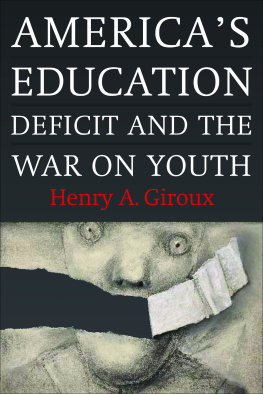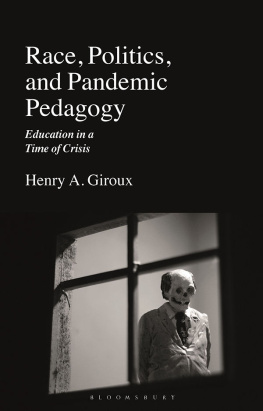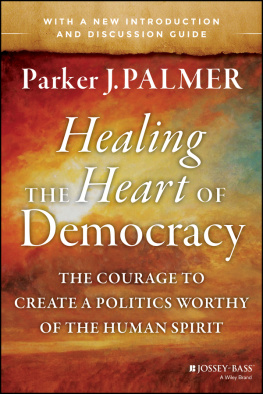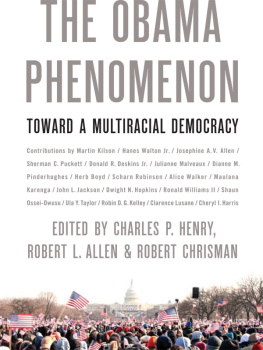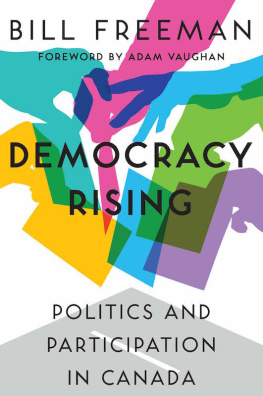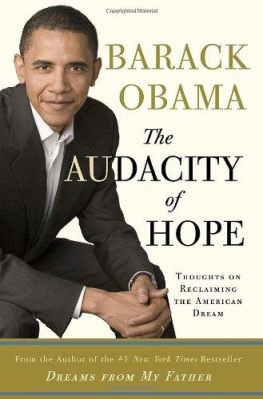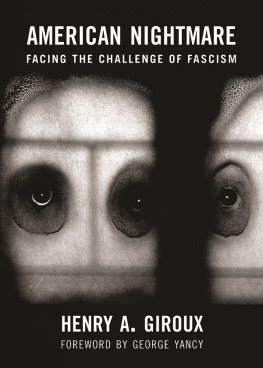POLITICS AFTER HOPE
THE RADICAL IMAGINATION
SERIES
Edited by Henry A. Giroux and
Stanley Aronowitz
Beyond the Spectacle of Terrorism: Global Uncertainty and the Challenge of the New Media, by Henry A. Giroux (2006)
Global Modernity, by Arif Dirlik (2006)
Left Turn: Forging a New Political Future, by Stanley Aronowitz (2006)
Stormy Weather: Katrina and the Politics of Disposability, by Henry A. Giroux (2006)
The Politics of Possibility: Encountering the Radical Imagination, edited by Gary A. Olson and Lynn Worsham (2007)
The University in Chains: Confronting the Military-Industrial-Academic Complex, by Henry A. Giroux (2007)
Guys and Guns Amok: Domestic Terrorism and School Shootings from the Oklahoma City Bombing to the Virginia Tech Massacre, by Douglas Kellner (2007)
Against Schooling: For an Education That Matters, by Stanley Aronowitz (2008)
Of Divine Warning: Reading Disaster in the Modern Age, by Jane Anna Gordon and Lewis R. Gordon (2009)
Forthcoming
Theory from the South: Or, How Euro-America is Evolving Toward Africa, by Jean Comaroff and John L. Comaroff
POLITICS AFTER HOPE
Barack Obama and the Crisis
of Youth, Race,
and Democracy
HENRY A. GIROUX
First published 2010 by Paradigm Publishers
Published 2016 by Routledge
2 Park Square, Milton Park, Abingdon, Oxon OX14 4RN
711 Third Avenue, New York, NY 10017, USA
Routledge is an imprint of the Taylor & Francis Group, an informa business
Copyright 2010, Taylor & Francis.
All rights reserved. No part of this book may be reprinted or reproduced or utilised in any form or by any electronic, mechanical, or other means, now known or hereafter invented, including photocopying and recording, or in any information storage or retrieval system, without permission in writing from the publishers.
Notice:
Product or corporate names may be trademarks or registered trademarks, and are used only for identification and explanation without intent to infringe.
Library of Congress Cataloging-in-Publication Data
Giroux, Henry A.
Politics after hope: Barack Obama and the crisis of youth, race, and democracy / Henry A. Giroux.
p. cm. (The radical imagination series)
Includes bibliographical references and index.
ISBN 978-1-61205-360-8 (Ebook)
1. United StatesPolitics and government2009. 2. YouthPolitical activityUnited States. 3. YouthGovernment policyUnited States. 4. ChildrenGovernment policyUnited States. 5. United StatesRace relationsPolitical aspects. 6. Education and stateUnited States. 7. Obama, Barack. I. Title.
JK1764.G57 2010
320.60973dc22
2010000836
Designed and Typeset by Straight Creek Bookmakers.
ISBN 13: 978-1-59451-852-2 (hbk)
ISBN 13: 978-1-59451-853-9 (pbk)
To Victoria Harper, who takes seriously what it means to
be a public intellectual working to make the world a more
just and better place. I am forever grateful for her courage,
patience, generosity, and belief that my work mattered.
To Susan, who has filled my life with so much joy and love.
This book would not have been written if I had not been asked by Victoria Harper to contribute articles to the online news magazine Truthout. She not only provided me with a new audience, but she also allowed me to demonstrate that there is no contradiction between theoretical rigor and clarity, on the one hand, and academic work and public life, on the other. She has been invaluable in encouraging me to write for Truthout and for pushing my work in a new direction. She is one of the best editors I have ever worked with and is an exemplary model for what it means to take seriously the political and civic relationship among writing, research, and the demands of democratic public life.
Moreover, her invitation to contribute to Truthout came just at the right time. Not only was the United States going through a major political transition with the election of Barack Obama to the presidency, but this also was a historic moment in which a new space for publicly engaged work seemed to be opening up as progressives across the country increasingly used the new media to support Obamas bid for the presidency and to mount a counterresponse to the suppression of dissent that had become the hallmark of the Bush-Cheney regime. Power was once again being held accountable, or at least for that moment in time it seemed possible once again to theorize politics from the space of a more open, humane, and just location. Existing neoconservative and neoliberal paradigms, especially those fostered during the Bush-Cheney years, organized around various poisonous species of religious, economic, and military fundamentalism seemed to be out of place, out of whack, and open to new interrogations and modes of analysis. The right-wing medias largely unchecked and relentless efforts to lie, misrepresent, and produce endless falsehoods in support George W. Bushs policies along with other forms of ideologically slanted public discourse seemed to weaken as a climate of manufactured fear, rabid nationalism, and an ongoing assault on critical thought and civil liberties appeared to ease up with Obamas election and his call for a new kind of politics.
A disparate array of issues related to gender, militarism, poverty, starvation, war, casino capitalism, ecological destruction, economic inequalities, and state terrorism were increasingly addressed critically by a growing number of discerning writers, artists, and journalists as the numbing and paralyzing charges of treason or anti-Americanism aimed at almost any form of dissent seem to lose their credibility and force. And yet in the midst of this new space of public debate and criticism, key elements of a truly transformative agenda went missing. There was a deadening silence from liberals and progressives about crucial issues such as the relationship between democracy and the fate of youth, the persistence of racism, and the central importance of education in providing a formative culture for social responsibility, engaged citizenship, and public values. Politics After Hope attempts to rupture the silence on such issues.
It also addresses another kind of silence. Just as the new critical media journalism seemed to gain some attention, far too many academics became more disengaged from public life. They hid behind the traditional firewall of jargon, staged forms of academic neutrality and professionalism, or eagerly offered their services to the rapidly growing military-industrial-academic complex.
Politics After Hope is, in part, about what Michel Foucault in much of his work referred to as the critical history of the present. Offering up an analysis of the first year of the Obama presidency, Politics After Hope also reaches back into history to engage a series of problems that have led up to the current historical conjuncture and have left a deep imprint on how politics is currently being defined and mobilized to shape the future. We live at a time when it is imperative for parents, academics, artists, cultural workers, and others to speak beyond the immediacy of their own identities, localities, and experiences. In particular, this means that anyone who cares about democracy has to take responsibility for making power accountable, has to embrace the totality of the problems that connect us all, and has to speak beyond the confines of the academy, union halls, workplaces, places of worship, homes, and often isolated communities. This book is also a call for academics to become public intellectuals and use their voices to raise the bar of intellectual critique and civic engagement.


